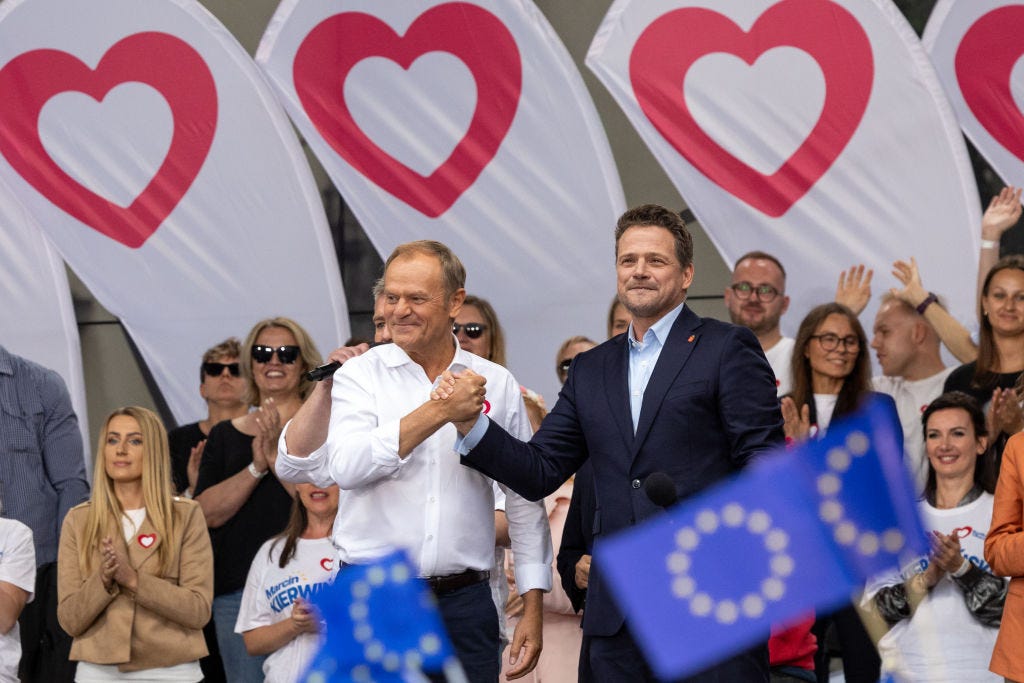Authoritarianism is Not Inevitable: The Other Side of the European Elections
Good news in Hungary, Poland, Nordic countries, and a possible new "Popular Front" in France
Welcome back to Lucid, and hello to all new subscribers. Our next Q&A will be on Friday, June 14, 1-2pmET. Paying subscribers will receive links to register for the Zoom gathering a few hours beforehand. If you’d like to join these amazing conversations, you can sign up as a paying subscriber or upgrade to paid here:
______________________
Authoritarians want to you feel that their ascendence and victories are predetermined and useless to resist. Too much coverage of the recent European parliamentary elections plays into this by concentrating on the surge of the far-right in some countries. These include Germany, where the AfD increased from 11% to more than 15%, and France, where the National Rally party performed very well.
Another narrative deserves our attention: the continued momentum of anti-authoritarian forces in Poland, Hungary, and the Nordic countries. There is also a new unity strategy now developing among the famously divided left in France. (This post is about Europe, but see my essay on Narendra Modi’s setback in India).
A anti-authoritarian counter-wave that focuses on solidarity rather than exclusion, and hope rather than fear, is building within Europe.
As someone who writes about the far right past and present, I am the last person to downplay the threats posed by the strong showing of the French National Rally Party. Given France’s importance within Europe and President Emmanuel Macron’s leading role in opposing Vladimir Putin’s imperialist war on Ukraine, it’s big news that the party got 31.5% of the vote —double what Macron’s Renaissance party got.
The National Rally platform featured the usual toxic stew of anti-immigrant and anti-Muslim hatred, disinformation about public health and climate change, homophobia, friendliness to Russia, and reactionary family policies. You can read my 2022 essay on National Rally leader Marine Le Pen’s skill at “selling hate with a feminine touch” here.
In 2022 Le Pen appointed Jordan Bardella, a 28 year old with a large social media following, as party leader. Bardella is useful in courting the youth vote, but people of all ages are the audience for his peddling of —surprise!—Great Replacement Theory. His version is “France is disappearing” due to immigration.

All eyes are also on France also because Macron made a surprise decision to dissolve the current legislature and hold snap elections in two rounds starting on June 30. As the Eurasia Group’s lead Europe analyst Mujtaba Rahman reports, this move has caused much trepidation and anger among EU officials, who have been working toward a renewed national security and defense unity strategy for Europe.
A National Rally majority, which could mean Bardella becomes Prime Minister, would complicate or even torpedo that. Bardella would likely become even more hardline if he gets that kind of power. Never forget that the original Fascism billed itself as a youth movement —the only movement able to save a degenerating and aging Europe.
Macron may be counting on the French to turn out in record numbers to save their democracy. Or, if the far right becomes part of the government, that National Rally will behave in power in ways that will alienate voters.
Yet, as Institut Montaigne analyst Georgina Wright commented, “the case of Trump shows that no amount of incompetence can ever be enough to dissuade voters. And to think French voters will somehow come to a different conclusion than American voters is silly.”
Ideally, this snap election would have an outcome that staves off a far-right fate for France. Macron’s presidency is not up for a vote, but Le Pen could become prime minister if National Rally’s votes are strong enough.
To prepare for that election, the French left may now pursue a strategy of unity, via a new “Popular Front” alliance. The reference to the 1930s electoral and grassroots anti-Fascist movement is not casual.
Elsewhere in Europe, there is anti-authoritarian momentum that should not be discounted. In Sweden, Finland, and Denmark, the far right did badly, while left and far left parties had their own surge.
In Hungary, the elections dealt a blow to Viktor Orban’s Fidesz party, which received almost 8% fewer votes than in 2019. They also provided a new center of gravity for the opposition Respect and Freedom (Tisza) party led by Péter Magyar. It earned over 29% of the vote and has been attracting huge crowds at its rallies.
And in Poland, the European elections consolidated the trend set in the last national elections, when Donald Tusk’s opposition defeated the far-right ruling party. Tusk is now prime minister, and his Civic Coalition earned a whopping 37.1% of the vote now, further strengthening its position.

It’s significant that in these two countries with current or recent experience with the afflictions of far-right governance there is a growing political will to turn away from authoritarianism towards centrist and progressive positions.
Let’s hold onto that when we consider the victories of the far right in France and Germany. Taken collectively, illiberal gains on the continent were less resounding than expected and highly contested. An anti-authoritarian movement is slowly but surely gaining ground.




You made me breathe a little easier. Hopefully the left will continue to gain some ground like it has in Poland and the Nordic lands. And hope it blows across the pond to our shores.
Thank you, Ruth.... Bannon who sees himself as a Leninist of the reactionary kind spent some time in Europe trying to tie the far right here with the far right there. I know our Republican Party has been playing to this theocratic form of Nationalism, and Bannon want to tell you its for 100 yrs.
Listen to what they say about a Unified Reich on their Truth Social....More like Lies of the Anti-Social..... but I digress.
I do think its a hopeful sign that people are getting weary of this movement. Most people can't live on a steady diet of hate. There's so much to be done to mitigate our biggest challenges this century.